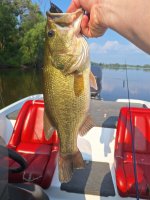Bob Peters
Well-known member
I was down around where I often hunt and was at a country boat ramp. There was a truck/boat with pheasant plates, so I walked over and asked the guys "Are you ready for pheasant season?" We struck up a conversation. The guy said he was, and it turns out he's got a lot of land. He's got food plots, crp, and manages the land for all wildlife. Fields he leases, part of the agreement is no mowing of ditches or hayfields until August. We talked and talked. And I told him I hadn't seen any pheasants for a while. He told me he's seen a lot of them lately and it should be an above average season. A nice thing to hear from a guy who is out every day in pheasant country. It was really refreshing to hear from a landowner doing everything he can to help the birds, be it his crop acres or set aside.
And I caught a whopper bass to boot.
And I caught a whopper bass to boot.

